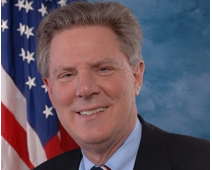Pallone Pushes for Broadband Privacy Vote
The smarter way to stay on top of the multichannel video marketplace. Sign up below.
You are now subscribed
Your newsletter sign-up was successful

The top Democrat on the House Energy & Commerce Committee, Rep. Frank Pallone Is pushing the FCC to proceed to a vote on strong new broadband privacy rules, saying the FTC model (of enforcing self-regulation) provided limited protections.
At almost the same time, the former top democrat on the House Energy & Commerce Committee, Henry Waxman, said the FTC model was the way to go, had been working, and that the FCC proposal, at least as originally constituted, would harm consumers.
"Weakening consumer protection is not the way to alleviate confusion," Pallone wrote. "Limited privacy protections are what we have now, and nearly half of internet users surveyed say the current privacy regime leaves them confused, discouraged, and impatient."
Both Pallone and Waxman are in agreement that the FCC and FTC need to better harmonize their privacy regulation. In a sort of Jack Spratt arrangement, the FCC oversees consumer online privacy when it comes to ISPs handling of user info, while he FTC handles the handling of Web site user info by edge providers like Google and Facebook. That is because the FTC is prohibited from regulating common carriers and the FCC redefined ISPs as common carriers in the Open Internet order.
But while Waxman, who now consults for communications companies, says that the FCC should take the tailored, more opt-out centric FTC approach, Pallone says the FCC should not weaken its opt-in approach to match the FTC's weaker authority. "To fully answer the public’s call and maximize the economic power of the internet, the two agencies must do all they can to protect consumers by using the tools that they have today," he said. "That means the FCC must act now to finalize strong, new privacy rules."
"Americans have made it clear that they want more control over their personal information," he said. "It’s time for the Federal Communications Commission (FCC) to act quickly and finally put in place strong rules for internet service providers, or ISPs, to protect consumers’ privacy."
Pallone says that the harmonizing of the approaches should come from Congress strengthening the FTC's privacy authority, not from the FCC failing to use its authority. The FCC is a rulemaking body, while the FTC is basically an enforcement agency, suing companies that fail to live up to privacy promises they have made.
The smarter way to stay on top of the multichannel video marketplace. Sign up below.
"Unlike the FCC, the FTC must follow an arduous process that makes it virtually impossible to adopt similar rules," he said. "Moreover, a recent court decision has thrown the legal landscape into chaos by potentially undermining the FTC’s already limited ability to protect consumers without the FCC’s help."
The U.S. court of Appeals for the Ninth Circuit ruled recently that the exemption that prevents the FTC from regulating common carriers is "status"-based and is not confined only to common carrier "activity" by an entity that has the status of a common carrier.(http://www.multichannel.com/news/courts/court-throws-out-ftc-throttling-...).
The FTC is challenging that ruling, given that it appears to insulate all of a common carrier's businesses--say if Verizon bought Yahoo!--from privacy regs (since the FCC doesn't regulate edge privacy).
Pallone also pointed to Republican efforts to weaken the FTC even as they point to it as the better model for privacy protections.
"The constraints on the FTC should not force us to throw our hands up and leave the public vulnerable," he said. "The cost on our economy is too high."
Contributing editor John Eggerton has been an editor and/or writer on media regulation, legislation and policy for over four decades, including covering the FCC, FTC, Congress, the major media trade associations, and the federal courts. In addition to Multichannel News and Broadcasting + Cable, his work has appeared in Radio World, TV Technology, TV Fax, This Week in Consumer Electronics, Variety and the Encyclopedia Britannica.

